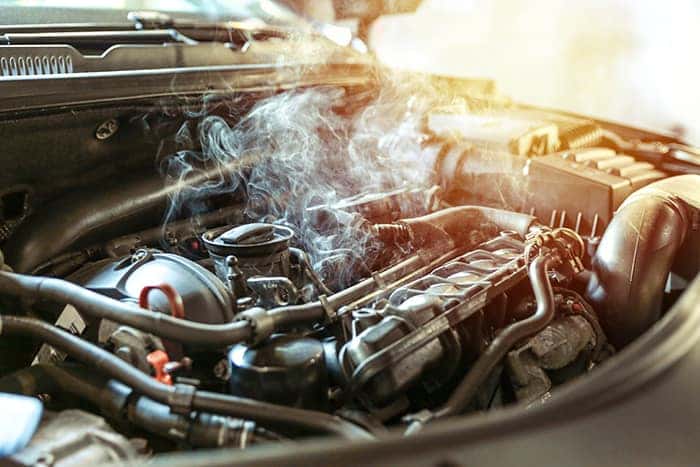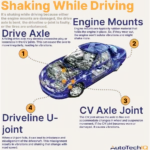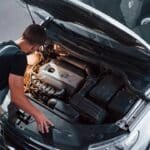Car overheating issues can be frustrating and stressful. These problems can arise at the worst possible times.
Car overheating is a common issue many drivers face. It can lead to serious engine damage and costly repairs if not addressed promptly. Understanding the causes and solutions for car overheating is essential for every vehicle owner. From faulty radiators to low coolant levels, various factors contribute to this problem.
This blog post will explore the reasons behind car overheating and offer practical tips to prevent and fix it. Whether you’re a seasoned driver or a new car owner, gaining knowledge about overheating issues can save you time, money, and headaches. Stay tuned to learn more about how to keep your car running cool and smoothly.

Credit: maderaautorepair.com
Common Causes Of Car Overheating
Car overheating can be a major issue. It can lead to engine damage if not addressed. Understanding the common causes of car overheating can help prevent it. Two common causes are low coolant levels and radiator problems.
Low Coolant Levels
Coolant keeps your car’s engine from overheating. Low coolant levels can cause the engine to overheat quickly. This often happens due to leaks in the system. Check the coolant level regularly. Refill it as needed to avoid overheating issues.
Radiator Problems
The radiator helps cool the engine. If it is blocked or leaking, the engine can overheat. Regular maintenance can prevent radiator issues. Clean the radiator and check for any leaks. Ensure the radiator fan is working properly. A faulty fan can also cause overheating.
Faulty Thermostat
A faulty thermostat can lead to car overheating issues. It might fail to regulate engine temperature. This can cause the engine to overheat, affecting performance and safety. Regular checks can prevent costly repairs.
A faulty thermostat can be the unsung culprit behind many car overheating issues. This small but crucial component regulates the flow of coolant to the engine. When it malfunctions, it can lead to a range of problems, some of which might leave you stranded on the side of the road. Understanding the signs of a bad thermostat and knowing your options for replacement can save you time, money, and a lot of stress. ###
Symptoms Of A Bad Thermostat
Imagine you’re driving on a sunny afternoon, and suddenly, the temperature gauge spikes. This could be your first clue. A bad thermostat often causes the engine to overheat quickly. Another symptom is temperature fluctuations. If your car’s temperature gauge swings between hot and cold, it could be a sign of a failing thermostat. Do you notice coolant leaks? A stuck thermostat can lead to excess pressure, causing the coolant to leak. Keeping an eye out for these signs is crucial. ###
Replacement Options
If your thermostat is shot, don’t panic. You have options. You can replace it yourself if you’re comfortable with basic car maintenance tasks. A simple online search will reveal a variety of thermostats available for purchase. Choose one that matches your car’s make and model. Not a DIY enthusiast? Visit a trusted mechanic. They’ll ensure the replacement is done correctly, so you can hit the road with peace of mind. Have you ever had a thermostat fail on you? Share your experiences in the comments and help others learn from your story.
Water Pump Failures
Water pump failures are a common cause of car overheating. The water pump is vital for cooling the engine. It circulates coolant through the engine and radiator. When it fails, the engine can overheat quickly. Knowing the signs of a failing water pump helps prevent serious damage.
Signs Of Malfunction
Look for coolant leaks. Puddles under the car indicate a problem. Another sign is a whining noise. This noise comes from a loose belt or a worn bearing. Overheating is a clear sign. If the temperature gauge rises, check the water pump. Steam from the engine is another indicator. Never ignore these signs. They can lead to bigger issues.
Repair And Replacement
Repairing a water pump involves replacing the faulty parts. Sometimes, the entire pump needs replacement. This depends on the damage. Mechanics usually replace the pump if it’s old. They also check the belts and hoses. Replacing these parts ensures the system works well. Regular maintenance prevents water pump failures. Have your car checked often. This keeps the cooling system in good shape.

Credit: www.youtube.com
Cooling System Blockages
Blocked cooling systems can lead to car overheating issues. This can damage the engine if not addressed quickly. Regular maintenance helps prevent such problems.
Car overheating can be a nightmare, especially when you’re stuck in traffic on a sweltering day. One of the key culprits behind this frustrating issue is cooling system blockages. These blockages can severely hinder your car’s ability to regulate temperature, leading to overheating. Understanding the root causes and solutions can help you keep your car running smoothly and avoid costly repairs.
Debris And Contaminants
Debris like leaves, dirt, or even small stones can sneak into your car’s cooling system. Such contaminants often find their way through the radiator grille, accumulating over time. This blockage can restrict coolant flow, causing your engine to overheat. Another common issue is the buildup of rust and sediment in the radiator. This often occurs if the coolant isn’t changed regularly. Over time, these particles can form a thick sludge, blocking the passageways meant for the coolant. Inspect your radiator regularly to catch these issues early. A quick visual check could save you from a more serious problem down the line. Have you ever wondered how much damage a few leaves could do?
Flushing The System
Regularly flushing the cooling system can prevent blockages from forming. This process involves draining out old coolant and replacing it with fresh fluid. It helps remove any accumulated debris or sludge, maintaining efficient coolant flow. Most manufacturers recommend flushing the system every two years or 30,000 miles. However, check your owner’s manual for specifics related to your vehicle. Keeping up with this maintenance task can increase your car’s longevity and performance. If you’ve never done a coolant flush before, consider getting it done by a professional. They have the tools and expertise to ensure the job is done right. Wouldn’t you want peace of mind knowing your car’s cooling system is in top shape?
Engine Oil And Overheating
Car overheating can lead to serious engine damage. One crucial factor is engine oil. Engine oil acts as a lubricant. It helps keep the engine cool. Without proper oil, engines can overheat quickly. This section explores the role of engine oil in preventing overheating.
Role Of Engine Oil
Engine oil reduces friction between moving parts. Less friction means less heat. Oil also helps carry heat away from the engine. It absorbs heat and moves it to cooler parts. This process keeps engine temperatures stable. Clean oil performs these tasks efficiently.
Maintaining Proper Oil Levels
Maintaining correct oil levels is vital. Low oil can lead to overheating. Check oil levels regularly. Use the dipstick to measure oil. Ensure the oil reaches the required mark. Refill if the level is low.
Always use the right type of oil. Consult your car’s manual for guidance. Different engines need different oils. Correct oil ensures efficient engine cooling. Regular oil changes are essential. Old oil loses effectiveness over time. New oil keeps the engine cool and running smoothly.

Credit: www.fordlincolnofcookeville.com
Solutions For Overheating Cars
Car overheating issues can be frustrating and potentially dangerous. If your car’s temperature gauge is climbing too high, it’s crucial to find solutions quickly to avoid costly damage. Whether you’re dealing with a minor issue or a major malfunction, knowing how to address overheating is essential for every driver. Let’s dive into some practical steps you can take.
Immediate Actions
When your car starts to overheat, you need to act fast. Turn off the air conditioning to reduce the load on your engine. This simple step can help lower the temperature quickly. If you’re stuck in traffic, shift into neutral or park and gently rev the engine. This increases airflow and aids cooling.
Pull over safely and let your car cool down. Open the hood to release heat. Be cautious when handling a hot engine; burns are a real risk. Carrying a bottle of coolant can be a lifesaver, topping up low levels might just solve the problem temporarily. Have you ever found yourself stranded due to an overheated engine? A quick stop and cool-down might have been all you needed.
Professional Repairs
If your overheating issues persist, professional help is necessary. A mechanic can diagnose complex problems like a faulty thermostat, radiator issues, or a broken fan. Replacing these components can be crucial for your car’s health. Ignoring these repairs may lead to engine damage.
Regular maintenance checks can prevent surprises. Consider scheduling periodic inspections, especially before long road trips. Mechanics can spot potential issues early, saving you from unexpected breakdowns. Have you ever considered how regular checks might save you money in the long run?
Finding a trusted mechanic can make all the difference. Look for reviews and recommendations. It’s reassuring to know your car is in capable hands, ensuring that overheating is a concern of the past. Have you found a reliable professional who gives you peace of mind?
Addressing car overheating requires both immediate and long-term solutions. Whether you’re taking quick action on the road or seeking professional repairs, being proactive is key. How will you tackle overheating problems in your car?
Preventive Maintenance Tips
Preventive maintenance is key to avoiding car overheating issues. Simple steps can keep your vehicle running smoothly. Regular checks and inspections help prevent unexpected problems. A well-maintained cooling system is essential for engine health.
Regular Coolant Checks
Check your coolant level often. Low coolant causes overheating. Ensure coolant is at the proper level. Inspect it for any signs of contamination. Clean coolant keeps your engine safe. Replace old coolant as needed. Follow your car’s manual for instructions.
Routine System Inspections
Inspect the radiator and hoses regularly. Look for leaks or cracks. Damaged parts may lead to overheating. Ensure the radiator cap is tight. A loose cap can cause coolant loss. Check the thermostat for proper function. A faulty thermostat can cause engine issues.
Driving Habits To Avoid Overheating
Driving habits can significantly impact the health of your car’s engine. Overheating is a common issue that many drivers face, often due to certain driving behaviors. Adjusting these habits can help prevent the temperature gauge from climbing into the danger zone. Small changes in how you drive can make a big difference in maintaining your car’s engine temperature. Let’s dive into some practical steps you can take to avoid overheating.
Safe Driving Techniques
Avoid aggressive driving. Hard acceleration and sudden braking put extra strain on your engine, causing it to work harder and potentially heat up. Instead, opt for smooth and steady driving. Gradual acceleration and gentle braking can keep your engine cooler and running efficiently.
Consider your driving route. If possible, choose routes that avoid heavy traffic. Sitting in traffic causes your engine to idle, which generates heat without the benefit of air circulation. Using side streets or less congested roads can help your engine stay cool.
Have you ever driven with the windows down on a hot day? This can increase drag and make your engine work harder, leading to overheating. When it’s hot outside, use your air conditioning and keep the windows up to reduce engine strain.
Monitoring Engine Temperature
Regularly check your dashboard temperature gauge. This simple habit can prevent overheating before it starts. If you notice the gauge rising, pull over safely and let your engine cool down. This proactive approach can save you from costly repairs.
Install an aftermarket temperature monitor for more precise readings. These monitors offer real-time updates, allowing you to respond quickly to changes. With this tool, you can keep a closer eye on engine temperature and act immediately if needed.
Don’t ignore warning signs. If your engine starts making strange noises or emitting unusual smells, it could be overheating. Listen to your car and take action quickly. Paying attention to these signals can prevent further damage and keep your car running smoothly.
Are your driving habits putting unnecessary stress on your engine? Making small adjustments can be a game-changer in preventing overheating. Take charge of your driving and keep your car running cool.
Frequently Asked Questions
How Do You Fix A Car That Overheats?
Check coolant levels and refill if low. Inspect for leaks in the radiator and hoses. Ensure the thermostat functions correctly. Clean or replace the radiator cap. Test the water pump and fan operation. Visit a mechanic for persistent issues.
Can I Drive My Car If It Was Overheating?
No, do not drive your car if it is overheating. Doing so can cause severe engine damage. Instead, pull over safely and let the engine cool down before seeking professional help.
What Is The Most Common Reason For Car Overheating?
The most common reason for car overheating is a malfunctioning cooling system. This includes issues like a faulty thermostat, leaking radiator, or damaged water pump. Regular maintenance and checks can prevent these problems, ensuring your car’s engine stays at optimal temperature.
Can An Engine Be Saved After Overheating?
Yes, an engine can sometimes be saved after overheating. Quick actions like cooling it and checking for damage are crucial.
Conclusion
Dealing with car overheating issues can be frustrating. Keep an eye on the temperature gauge. Regular maintenance prevents problems. Check coolant levels often. Listen for warning signs. Strange noises or steam need attention. Don’t ignore leaks. Quick fixes save money and stress.
Visit a mechanic if unsure. Protect your engine from damage. Keep your car running smoothly. Stay safe on the road. Understanding your car’s needs is crucial. A little care goes a long way. Enjoy peace of mind with a well-maintained vehicle.













